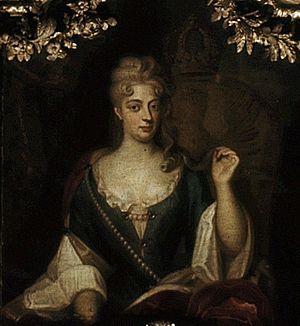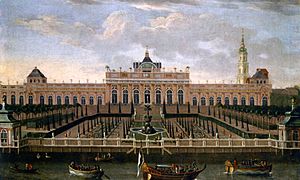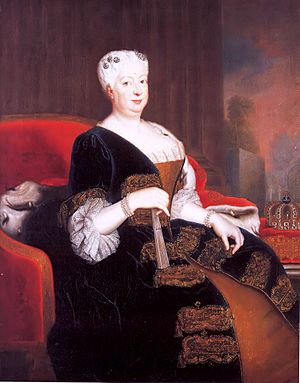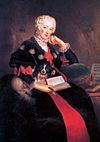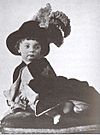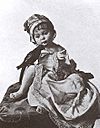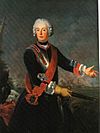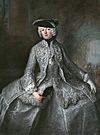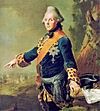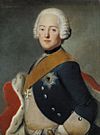Sophia Dorothea of Hanover facts for kids
Quick facts for kids Sophia Dorothea of Hanover |
|
|---|---|
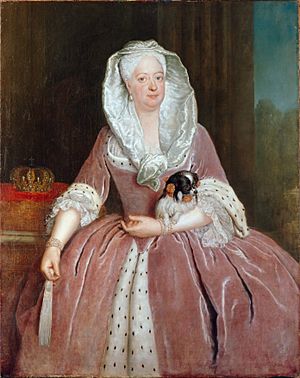
Portrait by Antoine Pesne, 1737
|
|
| Queen consort in Prussia Electress consort of Brandenburg |
|
| Tenure | 25 February 1713 – 31 May 1740 |
| Born | 16 March 1687 Hanover, Principality of Calenberg |
| Died | 28 June 1757 (aged 70) Monbijou Palace, Berlin |
| Spouse | |
| Issue |
|
| House | Hanover |
| Father | George I of Great Britain |
| Mother | Sophia Dorothea of Celle |
Sophia Dorothea of Hanover (born March 26, 1687 – died June 28, 1757) was a powerful queen in Prussia. She was also the Electress of Brandenburg. She held these titles while her husband, King Frederick William I, ruled from 1713 to 1740. Sophia Dorothea was the mother of Frederick the Great, who later became King Frederick II of Prussia.
When Sophia was born, her father was just a German prince's son. He later became King George I of Great Britain in 1714. By then, Sophia was 27 years old. She was already the Queen of Prussia and had many children.
Contents
Life as a Princess
Sophia Dorothea was born on March 16, 1687, in Hanover. She was the only daughter of George Louis of Hanover (who became King George I of Great Britain) and his wife, Sophia Dorothea of Celle. Her older brother, King George II of Great Britain, did not like her very much.
After her mother's divorce and imprisonment, Sophia grew up in Hanover. Her grandmother, Sophia of Hanover, looked after her. She was taught by her French teacher, Madame de Sacetot.
Her Royal Marriage
On November 28, 1706, Sophia Dorothea married her cousin, Crown Prince Frederick William of Prussia. He was the next in line to the Prussian throne. They had met as children when Frederick William stayed in Hanover with their grandmother. Sophia Dorothea didn't like him much, but Frederick William was attracted to her early on.
When it was time for Frederick William to marry, he had two choices: Princess Ulrika Eleonora of Sweden or Sophia Dorothea. His father wanted him to marry the Swedish princess to form an alliance. However, Frederick William preferred Sophia Dorothea. He made sure his father heard a discouraging report about Ulrika Eleonora. This made it easier for him to choose Sophia Dorothea.
A marriage between Prussia and Hanover was a good choice for both royal families. The plans were made quickly. Sophia's grandmother, Electress Sophia, ordered her wedding clothes from Paris. Her bridal items were very grand and attracted a lot of attention.
The wedding ceremony was held in Hanover on November 28, 1706. Sophia arrived in Berlin on November 27. Her groom and his family welcomed her outside the city gates. After her grand entrance into the capital, there was a second wedding ceremony, a torch-dance, and six weeks of parties and balls.
Crown Princess of Prussia
Sophia Dorothea was described as tall and graceful. She had a beautiful, slender figure and big blue eyes. People thought she was very attractive and charming. Frederick William often called her "Fiekchen."
Sophia Dorothea and Frederick William were very different. This caused problems in their marriage. Sophia Dorothea loved art, science, books, and fashion. Frederick William was a rough military man who didn't care for such things. He was never unfaithful, but he couldn't win her affection. Sophia loved entertainment, which her husband thought was silly. He even thought about divorcing her the same year they married.
In 1707, her first son, Frederick Louis, was born. This was a big celebration in Prussia. Sophia Dorothea even asked the king to free an imprisoned minister, which he did. After her first son died in 1708, doctors thought Sophia Dorothea might not have more children. But she had several more children in the following years. In 1712, she finally had another son who survived.
Becoming Queen of Prussia
In 1713, her father-in-law, Frederick I, died. Her husband, Frederick William I, became king, making her the Queen of Prussia.
She lived with her family in the Berlin Palace. She also had to spend summers at the City Palace, Potsdam and go on hunting trips with her husband. But she often went to Monbijou Palace, a small palace in Berlin. Her father-in-law had given it to her in 1712. She gradually moved her court there and lived there for the rest of her life.
When her husband became king, Prussia was at war with Sweden. Sophia Dorothea joined Frederick William during a military campaign in 1715. However, she soon returned to Berlin to give birth to her daughter. During the war, the king told his ministers to ask her for advice in emergencies. In 1717, she hosted Peter the Great at her Monbijou Palace.
Queen Sophia Dorothea was admired for her polite manners. She was called "Olympia" because of her regal way of carrying herself. She was known for being proud and ambitious. However, Frederick William did not like her getting involved in politics. He believed women should only have children and obey their husbands.
The king was known for being very strict with money and hating laziness. He would even hit people in the street or palace if he thought they were lazy. The queen complained about how little money he allowed for the household.
Frederick William thought her interests in theater, dancing, jewelry, and music were silly. He didn't like her doing things without his permission. He especially disliked her gambling. It's said that she and her friends would have coffee beans ready to pretend to play with them if the king appeared. Once, when the king was ill, the queen held a ball at Monbijou with dancing and music. She was gambling while wearing her diamond jewelry. When the king suddenly arrived, the music stopped, and she quickly hid her jewels.
His behavior towards her was often rough. When her mother died in 1726, Sophia Dorothea inherited a large sum of money. People noticed that Frederick William suddenly treated her very well. But when she didn't receive the money (because her brother refused to release it), he went back to his usual behavior. Sophia Dorothea, for her part, didn't think much of the king's military skills.
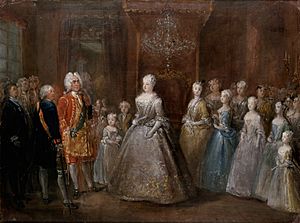
When the king was ill in 1719, he sent for Sophia Dorothea. He gave her his will and told her to keep it secret. The will named her as regent if their son became king while still a child. After this, the queen's favorite, Madame de Blaspiel, was involved in some plots and was eventually arrested and banished. The queen then made her daughter, Princess Wilhelmine, her new confidant.
Sophia Dorothea was very close to her oldest son, Crown Prince Frederick. His father treated him very harshly, thinking he was not manly enough. According to her daughter Wilhelmine, the queen made the problems between the king and the crown prince worse. She showed that she thought the king's demands were unfair. The king accused her of hurting his relationship with their children. He banned them from seeing her without him present. But she would secretly invite them to her rooms. Sometimes, Frederick and Wilhelmine had to hide in the furniture when Frederick William unexpectedly came into her room.
The king often became violent in his later years. He would hit people with his cane and throw things at his children. This was very hard for his family.
Marriage Plans for Her Children
Sophia Dorothea really wanted her oldest son, Crown Prince Frederick, to marry Princess Amelia of Great Britain. She also wanted her oldest daughter, Wilhelmine, to marry Frederick, Prince of Wales (who would become a future Prince of Wales). This plan would create a strong alliance between Prussia and Great Britain.
In 1723, the queen convinced the king to agree to these marriages. In October of that year, they hosted a visit from George I in Berlin. He approved of Wilhelmine and agreed to the double marriage if the British Parliament also approved.
Sophia Dorothea tried to handle the marriage negotiations herself. But she didn't succeed. When she returned to Berlin, Frederick William was so unhappy that he had the passage between their apartments walled up for six weeks. The Prince of Wales even sent an agent to ask if he could secretly visit Wilhelmine. The queen agreed but made the mistake of telling the British ambassador. This caused problems, and the Prince of Wales was called back to England. This made the king very angry with the queen and the marriage plans.
From 1726 to 1735, Friedrich Heinrich von Seckendorff was the Austrian ambassador and the king's favorite. He was against the British-Prussian marriage alliance. The king knew about the queen's dislike for Seckendorff.
In 1729, the marriage talks were stopped because Frederick William's army recruiters were kidnapping tall men from Hanover. This caused diplomatic issues. But the queen restarted the talks. When her independent talks were revealed to the king, he threatened to marry Wilhelmine to another prince or imprison Sophia for life.
She was advised to suggest Prince Frederick of Bayreuth as an alternative. She did, and then wrote to the Queen of Great Britain claiming to be ill. The king found out she was pretending. He hit Wilhelmine in front of Sophia. Sophia then agreed to drop the British marriage plan, as long as Wilhelmine married Frederick of Bayreuth. She then became truly ill. She successfully asked the king to make up with their oldest son and daughter. After that, he only punished them in private.
Things changed when the British ambassador Hotham arrived. He officially suggested Wilhelmine marry the Prince of Wales. He also said Crown Prince Frederick should marry Amelia of Great Britain. The king agreed if he was shown proof that his anti-British favorite, Grumbkow, was guilty of treason. The queen had the crown prince write to Hotham to try and make peace with the king. Before leaving Prussia, Hotham left the evidence against Grumbkow with the queen.
Crown Prince's Escape Attempt
Sophia Dorothea spent many days talking with her oldest son in the library. She learned about his plans to escape from his father. In August 1730, Frederick tried to escape during a trip with his father. He was caught and brought back as a prisoner. The king told the queen that her son was dead. She replied, "What! Have you murdered your son?" When he said, "He was not my son, he was only a miserable deserter," she became very upset. The king then started to hit Wilhelmine. Her siblings and ladies-in-waiting stepped in. Frederick's friend, Katte, arrived as a prisoner, so the king hit him instead. When Frederick was imprisoned, Grumbkow helped Frederick and his parents make up.
After Frederick's imprisonment, the king and queen continued to argue about Princess Wilhelmine's marriage. The king wanted her to marry the Margrave of Schwedt or the Prince of Weissenfels. The queen secretly sent messages to her daughter, telling her not to accept anyone but the Prince of Wales. This argument made the king threaten to hit the queen. Finally, Wilhelmine was given a choice. She chose to marry the Prince of Bayreuth, on the condition that her father free her brother. Her mother was angry with her for this choice and threatened to disown her.
After Wilhelmine's engagement, a message arrived from George II. He agreed to Wilhelmine marrying the Prince of Wales without her brother marrying his daughter Amelia. This made the queen believe a Prussian-British marriage alliance was still possible. She tried to stop Wilhelmine's wedding to the Prince of Bayreuth. On the wedding day (November 20, 1731), Sophia Dorothea tried to delay the ceremony. She kept messing up her daughter's hair, hoping a British messenger would arrive in time to stop the wedding.
When Frederick was freed after his sister's wedding, Sophia Dorothea continued talks with Great Britain. She wanted him to marry Princess Amelia. She also wanted her next daughter, Philippine Charlotte, to marry the Prince of Wales. But these plans were ruined in 1733. Frederick William announced a different marriage plan. Frederick would marry Elisabeth Christine of Brunswick-Wolfenbüttel-Bevern, and Philippine Charlotte would marry Charles I, Duke of Brunswick-Wolfenbüttel.
Sophia still tried to arrange a Prussian-British marriage. She tried to get her third daughter, Louisa Ulrika, to marry the Prince of Wales. But this plan was also crushed when the Prince of Wales married Princess Augusta of Saxe-Gotha in 1736. Louisa Ulrika later became the Queen of Sweden.
Sophia Dorothea supported France in the War of the Polish Succession (1733–36). She did not like the king's support for Austria in the war.
During the king's last years, he was often ill and used a wheelchair. Sophia Dorothea was ordered to stay with him constantly. She rarely left his room for months before his death. She helped him and comforted him.
In November 1739, the king became very ill. The queen sent for the crown prince on May 26, 1740. When Frederick arrived, he was surprised to find the king in his chair in the garden. The king had a long final talk with his son. He said a sad goodbye to the queen, his sons, daughters, and other family members.
On the day he died, Frederick William asked to be taken to the queen's apartment. He told her, "Rise, I have but a few hours to live, and I would at least have the satisfaction of dying in your arms." However, the queen was led out of the room as Frederick William passed away in the arms of his son.
Life as Queen Dowager
On May 31, 1740, Frederick William died. Her son, Frederick II (the Great), became the new king.
Sophia Dorothea was deeply affected by the loss of her husband. Even though he had often treated her harshly, they had been together for many years. When her daughter, the Marchioness of Bayreuth, visited Berlin, she found her mother in deep mourning and looking very sad.
Sophia Dorothea had a very good relationship with her son, the new king. When she called him "Your Majesty" after his father's funeral, he stopped her. He told her, "Always call me your son, that title is dearer to me than the royal dignity." Frederick was very devoted to his mother. He thanked her for raising him and never blamed her for his difficult childhood. He blamed his father instead and never allowed anyone to criticize her.
Sophia Dorothea remained important as the queen dowager. The king showed her great respect and often neglected his own wife. Foreign visitors and others seeking favors thought it was more important to attend the queen dowager's events than the queen's. Until her death, he honored her as the most important lady at his court. He always placed her before his wife, the queen. The king would visit his mother's room first when he returned from military campaigns. He would invite his mother to his home in Potsdam, where his wife was never invited. While he rarely visited his wife, he regularly visited his mother at Monbijou. He would take off his hat and stand until she gave him permission to sit. Sophia Dorothea led the weddings of her son Prince William in 1742 and her daughter Louisa Ulrika in 1744.
Sophia Dorothea's relationship with her daughter-in-law, Queen Elisabeth Christine, was not good at first. She didn't like that her daughter-in-law had a higher official rank, even though her son said it was just for show. But their relationship improved in her last years. Sophia Dorothea saw her son for the last time in January 1757, after his first campaign in the Seven Years' War. She was well then, but her health quickly declined after he left. She died on June 28, 1757.
Her Children
| Issue | ||||||||||||||||||||||||||||||||||||||||||||||||||||||||||||
|---|---|---|---|---|---|---|---|---|---|---|---|---|---|---|---|---|---|---|---|---|---|---|---|---|---|---|---|---|---|---|---|---|---|---|---|---|---|---|---|---|---|---|---|---|---|---|---|---|---|---|---|---|---|---|---|---|---|---|---|---|
|
Family Tree
| Ancestors of Sophia Dorothea of Hanover | |||||||||||||||||||||||||||||||||||||||||||||||||||||||||||||||||||||||||||||||||||||||||||||||||||||||||||||||||||||||||||||||||||||||||||||||||||||||||||||||||||||||||||||||||||||||||||||||||||||||||||||||||||||||||||||||||||||||||||||||||||||||||||||||||||||||||||||||||||||||||
|---|---|---|---|---|---|---|---|---|---|---|---|---|---|---|---|---|---|---|---|---|---|---|---|---|---|---|---|---|---|---|---|---|---|---|---|---|---|---|---|---|---|---|---|---|---|---|---|---|---|---|---|---|---|---|---|---|---|---|---|---|---|---|---|---|---|---|---|---|---|---|---|---|---|---|---|---|---|---|---|---|---|---|---|---|---|---|---|---|---|---|---|---|---|---|---|---|---|---|---|---|---|---|---|---|---|---|---|---|---|---|---|---|---|---|---|---|---|---|---|---|---|---|---|---|---|---|---|---|---|---|---|---|---|---|---|---|---|---|---|---|---|---|---|---|---|---|---|---|---|---|---|---|---|---|---|---|---|---|---|---|---|---|---|---|---|---|---|---|---|---|---|---|---|---|---|---|---|---|---|---|---|---|---|---|---|---|---|---|---|---|---|---|---|---|---|---|---|---|---|---|---|---|---|---|---|---|---|---|---|---|---|---|---|---|---|---|---|---|---|---|---|---|---|---|---|---|---|---|---|---|---|---|---|---|---|---|---|---|---|---|---|---|---|---|---|---|---|---|---|---|---|---|---|---|---|---|---|---|---|---|---|---|---|---|---|---|---|---|---|---|---|---|---|---|---|---|---|---|---|---|---|
|
|||||||||||||||||||||||||||||||||||||||||||||||||||||||||||||||||||||||||||||||||||||||||||||||||||||||||||||||||||||||||||||||||||||||||||||||||||||||||||||||||||||||||||||||||||||||||||||||||||||||||||||||||||||||||||||||||||||||||||||||||||||||||||||||||||||||||||||||||||||||||
See also
 In Spanish: Sofía Dorotea de Hannover para niños
In Spanish: Sofía Dorotea de Hannover para niños
 | Isaac Myers |
 | D. Hamilton Jackson |
 | A. Philip Randolph |


